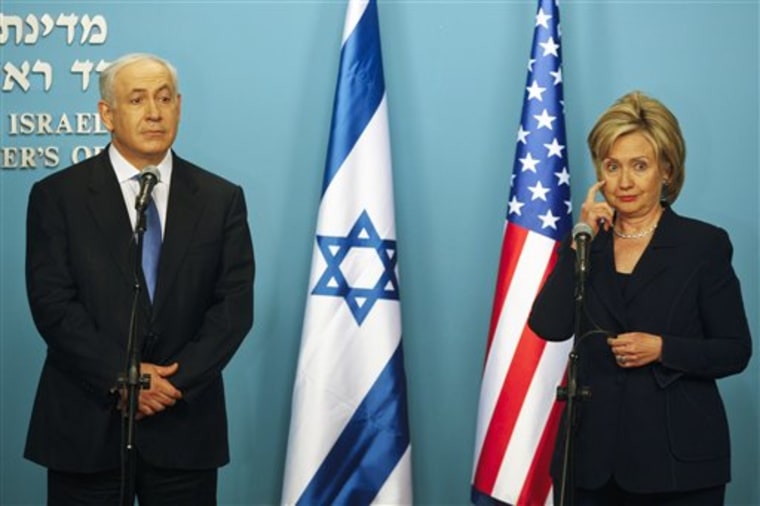The Palestinians on Sunday accused U.S. Secretary of State Hillary Rodham Clinton of undermining progress toward Mideast peace talks after she praised Israel for offering to curb some Jewish settlement construction.
After meeting Israeli and Palestinian leaders during a visit Saturday, Clinton called for an unconditional resumption of peace talks and welcomed Israel's offer for a slowdown in settlement activity.
But Palestinians rejected the idea of resuming talks, reiterating their demand that Israel must first freeze all construction of Jewish settlements in the West Bank and east Jerusalem — lands they claim for a future state.
"I believe that the U.S. condones continued settlement expansion," Palestinian government spokesman Ghassan Khatib said in a rare public chiding of Washington.
"Calling for a resumption of negotiations despite continued settlement construction doesn't help because we have tried this way many times," Khatib added. "Negotiations are about ending the occupation and settlement expansion is about entrenching the occupation."
Disappointment and frustration
Palestinians expressed deep disappointment and frustration at Clinton's words, which signaled a departure from past U.S. calls for a complete freeze on settlement activity.
"If America cannot get Israel to implement a settlement freeze, what chance do Palestinians have of reaching agreement with Israel on permanent status issues?" Palestinian negotiator Saeb Erekat said.
Similar sentiments were voiced by Jordan and Egypt, the only two Arab countries to have peace agreements with Israel. The two countries said most of the blame lay with Israel, but signaled their unhappiness with the American shift.
Jordan's King Abdullah II traveled to Cairo for talks with Egyptian President Hosni Mubarak. After the meeting, a royal palace statement released in Jordan said both leaders "insisted on the need for an immediate halt of all Israeli unilateral actions, which undermine the chances of achieving peace, especially the settlement construction."
Clinton is set to meet with Arab foreign ministers in Morocco in the coming days.
After taking office at the start of this year, President Barack Obama buoyed Palestinian hopes with his outreach to the Muslim world and an initially tough stance urging a full freeze to all settlement construction.
But after making little headway with the Israelis in recent months, Clinton urged the Palestinian leader in a face-to-face meeting on Saturday to renew talks, which broke down late last year, without conditions.
Clinton praises Netanyahu's offer
Then, at a joint news conference with Israeli Prime Minister Benjamin Netanyahu late Saturday, she praised Netanyahu's offer to curb some settlement construction.
"What the prime minister has offered in specifics on restraints on a policy of settlements ... is unprecedented," Clinton added. "I want to see both sides as soon as possible begin negotiations."
Netanyahu has said he will not create any new settlements in the West Bank and indicated he would temporarily suspend any plans for future construction. But he has insisted Israel would not limit building in east Jerusalem, which it annexed after capturing it. And he has refused to call off the construction of 3,000 apartments in the West Bank that already have been approved.
The Palestinians say the settlements are undermining their dream of independence by gobbling up large chunks of territory they claim as part of a future state. Some 500,000 Israeli settlers now live in the West Bank and east Jerusalem, which Israel captured in 1967.
Israel promised to halt all settlement activity in a 2003 peace plan, but construction has never stopped.
Palestinian President Abbas has been badly weakened by the perception among his public that he has repeatedly buckled under U.S. pressure. With Palestinian elections scheduled for January, Abbas is wary of again caving in to Washington.
‘U.S. position is biased’
Abbas' rival, the Hamas militant group, urged the president to resist American calls to restart peace talks. "The Arab and Muslim people know well that the U.S. position is biased," aid Mohammad Nazzal, a top member of the group's exiled leadership in Syria.
Senior Palestinian officials are waiting to see what comes out of Clinton's talks with Arab foreign ministers in Morocco this week. While disappointed with the U.S. stance, Abbas wants to avoid a confrontation with Washington.
Encouraged by the U.S. backing, Netanyahu on Sunday urged the Palestinians to "come to their senses" and restart peace talks.
"The peace process is in the Israeli interest and also in the Palestinian interest. It is important and we are committed to it and we hope that as we are prepared to begin talks without delay, we shall find the Palestinians sharing the same attitude," he told his Cabinet.
More on: Hillary Rodham Clinton
